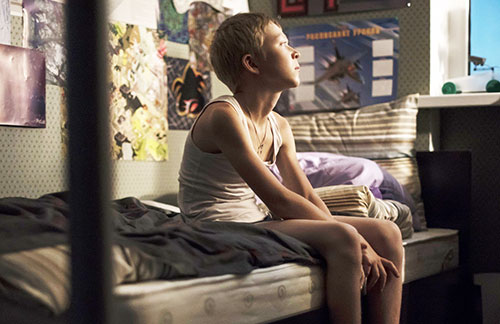Loveless is set in Moscow, at the approach of winter in 2012. A snippet from a radio broadcast reveals there’s much talk of a looming apocalypse, foretold hundreds of years back by the Mayan civilisation. Remember that? Well, the predicted doomsday never materialised. But from the unforgivingly bleak picture of the world that Andrey Zvyaginstev’s film presents you’d be forgiven for wondering what was worth saving.
Armageddon notwithstanding, the film is stalked by a terrible sense of catastrophe. This is an impressive piece of cinema that combines muscular, visual storytelling with powerful performances: but it’s strong stuff, grim, wrenching and darkly unsettling.
It begins at the end of something: a marriage in its exhausting terminal stages. Zhenya (Maryana Spivak) is selling the Moscow apartment she shares with her 12-year-old son Alyosha, and when buyers come to inspect the property they ask why she’s so keen to be rid of it. “Divorce,” she explains, with relief, and the reason for that relief is evident later on, when her soon-to-be-ex-husband Boris (Aleksey Rosin) visits. The fight that quickly ensues is a horrifying spectacle, staged in relentless long takes by Zvyaginstev and performed with raw honesty, applied with jagged aggression by each party, intended to hurt.
The fight that quickly ensues is a horrifying spectacle, staged in relentless long takes by Zvyaginstev and performed with raw honesty
What they’re bickering about is especially unedifying: the custody of young Alyosha. Zhenya and Boris are now with new lovers, and neither wants responsibility for their son. The argument represents a kind of nadir of parental care, and its only redeeming feature is that they’ve at least waited for Alyosha to go to bed before talking about him like this.
Except, unknown to his parents (and shockingly revealed to us), the young boy got up and has overheard everything. Naturally he’s crushed. It’s perhaps no surprise then that a few days later Alyosha disappears.










